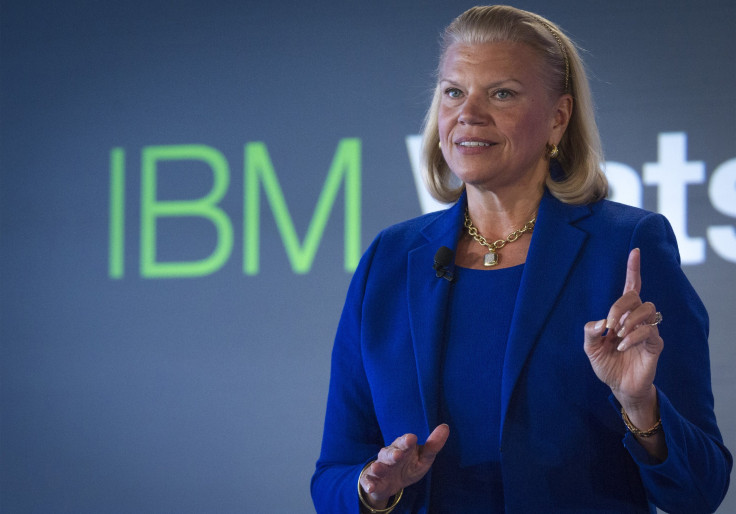Which Company Earned The Most US Patents In 2015?

Technology giant International Business Machines Corporation won more U.S. patents than any other company in 2015, landing 7,355 grants. That works out to about 20 patents a day, including weekends. The designs range from an artificial neural network meant to serve as a computer processor to a newfangled authentication system that could lock a bank account if it detects fear or nervousness as someone makes a purchase.
Together, the concepts shadow the company’s emphasis on its fast-growing cloud platform and cognitive computing technologies. Over 2,000 of the new patents came from those two segments. But while it’s tempting to think of patents as a proxy for innovation, experts say that’s not always the case. Patents can also be used as a litigation tool or a way to secure hefty licensing fees.
“Uber's growth industry is the next market. Google’s growth industry is the driverless car,” said Gary Reback, an antitrust lawyer with the law firm Carr & Ferrell in Silicon Valley. “IBM's growth market is — we've got to get some more new patents.”
IBM has been awarded more U.S. patents than any other company for 23 years in a row. The number of grants it collected in 2015 was about 30 percent more than Samsung, the second-place finisher with 5,072 patents. Canon followed in third place with 4,134 while Google, Sony and Intel landed elsewhere in the top 10. Microsoft finished in tenth place with 1,956 patents.
IBM, which spends about 6 percent of its revenue on research and development, has received more than 88,000 U.S. patents in the past 23 years of the company’s 105-year history. And its executives tout that number as a sign of the company’s devotion to research and innovation.
“We have a simple recipe for longevity which is you invent the future,” Bernie Meyerson, IBM’s chief innovation officer, said. “ Because if you don't invent and invest in the future, somebody's going to do it for you and eat your lunch.”
Lately, IBM has even attempted to reinvent itself by shifting away from traditional hardware to fervently pursue new business opportunities related to its cloud services and artificial intelligence. Revenue from its cloud platform grew at 45 percent, according to the company’s latest quarterly report from October 2015, compared with decreases sustained by its global technology services, and software and hardware products.
IBM’s most famous cognitive computing service, named Watson, has launched partnerships and research projects with a dizzying array of corporate and academic partners — from spawning a virtual coach with Under Armour to detecting food safety issues for Mars Inc, to offering nutritional advice to pregnant women with Nutrino.
This year’s slew of patent filings bear the fingerprints of the company’s new focus. One of IBM’s patents protects an automated series of questions and answers used by a computer to determine whether it’s interacting with a human or another computer.
Although patents have a symbolic history of representing ingenuity, their cachet has eroded in recent years. Josh Lerner, an expert in technological innovation at Harvard Business School, said recent court decisions and patterns at the U.S. Patent and Trademark Office have made it easier than ever to earn and defend patents.
“In a lot of cases, you can get hundreds of similar patents,” he said. “I think you need to take these things with a grain of salt.”

Tech companies in particular are notorious for filing broad, vague patents that could be interpreted in many ways, and then using these protections to file suit against other companies or demand hefty licensing fees. Critics say these sums prevent new players from entering the market and competing with big, established tech behemoths.
“In most Silicon Valley companies, when they get patents they do it to try to protect themselves from other companies like IBM from showing up and making demands on them,” Reback noted. IBM declined to share how much it receives in licensing fees.
Meyerson denies that the company files patents for the purpose of litigating and says the benefits of protecting its innovations vastly outweigh any revenue they produce through licensing or legal fees. “Using patents as a warfare technique can actually badly inhibit innovation and that's the last thing on Earth we want to do,” he said.
Meyerson added that IBM does take pains to protect the full “landscape” of a new technology it invents so as not to become an unwitting victim of infringement, but said the company does not go out of its way to file patents that aren’t necessary due to expense. “These are not trivial patents,” he said. “We're looking for the sort of thing that doesn't just move the needle, but it breaks it.”
Reback remains skeptical, suggesting IBM’s vast affinity for patents has more to do with generating revenue than protecting thousands more original ideas each year than its competitors.
Meanwhile, Congress is considering the Innovation Act in the House and the PATENT Act in the Senate that offer a mix of protections to patent holders and aggressive measures to stop the practice of “patent trolling” or using a patent to litigate against a broad range of interpretations for its use. IBM spent $3.7 million to lobby Congress on a wide range of issues including those bills in 2015, according to OpenSecrets.org.
© Copyright IBTimes 2024. All rights reserved.





















